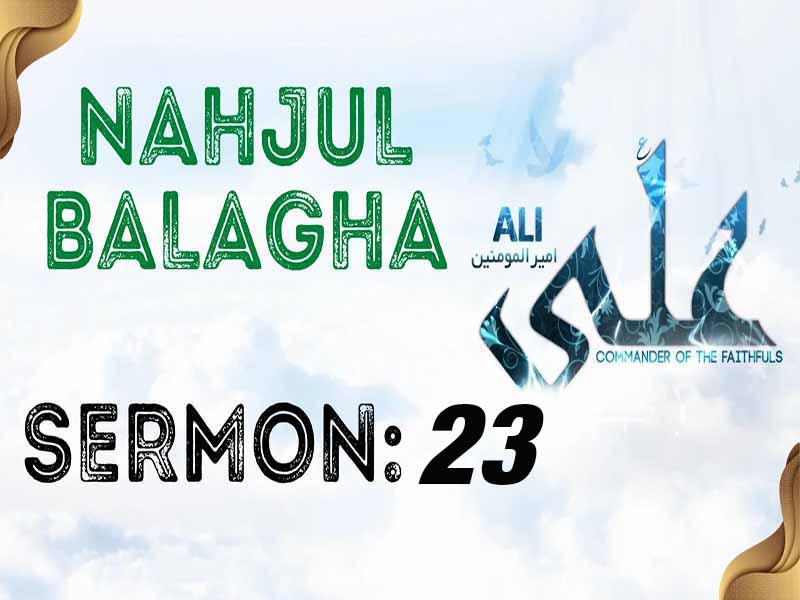پس از ستایش پروردگار، بدانید كه تقدیرهای الهی چون قطرات باران از آسمان به سوی انسان ها فرود می آید، و بهرۀ هر كسی، كم یا زیاد به او می رسد. پس اگر یكی از شما برای برادر خود، برتری در مال و همسر و نیروی بدنی مشاهده كند، مبادا فریب خورد و حسادت كند؛ زیرا مسلمان (تا زمانی كه دست به عمل پستی نزده كه از آشكار شدنش شرمنده باشد و مورد سرزنش مردم پَست قرار گیرد). به مسابقه دهنده ای می ماند كه دوست دارد در همان آغاز مسابقه پیروز گردد تا سودی به دست آورد و ضرری متوجّه او نگردد. همچنین مسلمانی كه از خیانت پاك است انتظار دارد یكی از دو خوبی نصیب او گردد: یا دعوت حق را لبیك گفته عمر او پایان پذیرد « كه آنچه در نزد خداست برای او بهتر است » ؛ و یا خداوند، روزی فراوان به او دهد و صاحب همسر و فرزند و ثروت گردد، و همچنان دین و شخصیت خود را نگاهدارد. همانا ثروت و فرزندان، محصول دنیا و فانی شدنی، و عمل صالح زراعت آخرت است، گر چه گاهی خداوند، هر دوی آن را به ملّت هایی خواهد بخشید. از خدا در آن چه اعلام خطر كرده است بر حذر باشید! از خدا آنگونه بترسید كه نیازی به عذرخواهی نداشته باشید! عمل نیك انجام دهید بدون آن كه به ریا و خودنمایی مبتلا شوید؛ زیرا هركس، كاری برای غیر خدا انجام دهد، خدا او را به همان غیر، واگذارد.
از خدا، درجات شهیدان، و زندگی سعادتمندان، و همنشینی با پیامبران را درخواست می كنیم. ای مردم!، انسان هر مقدار كه ثروتمند باشد، باز از خویشاوندان خود بی نیاز نیست كه از او با زبان و دست دفاع كنند. خویشاوندان انسان، بزرگ ترین گروهی هستند كه از او حمایت می كنند و اضطراب و ناراحتی او را می زدایند؛ و در هنگام مصیبت ها نسبت به او، پرعاطفه ترین مردم می باشند. نامِ نیكی كه خدا از شخصی در میان مردم رواج دهد بهتر از میراثی است كه دیگری بردارد.
آگاه باشید!، مبادا از بستگان تهیدست خود روبرگردانید، و از آنان چیزی را دریغ دارید، كه نگاه داشتنِ مال دنیا، زیادی نیاورد و از بین رفتنش كمبودی ایجاد نكند. آن كس كه دستِ دهندۀ خود را از بستگانش باز دارد، تنها یك دست را از آنها گرفته امّا دست های فراوانی را از خویش دور كرده است؛ و كسی كه پر و بال محبّت را بگستراند، دوستی خویشاوندانش تداوم خواهد داشت.
می گویم: (غفیره، در اینجا به معنای فراوانی اموال است، چنان كه جمعیّت فراوان را نیز «الجم الغفیر » می گویند، و نقل شد كه به جای «الغفیره «،» عفوة من اهل او مال »، به كار می بردند، و «عفوة » به معنای نمونۀ خوب از میان یك جنس است، چنان كه گفته میشود، « اكلت عفوة الطعام » یعنی قسمت های خوب غذا را خوردم. و چه زیباست معنایی كه امام (ع) از جملۀ «و من یقبض یده عن عشیرته » تا آخر كلام اراده فرمود، زیرا كسی كه خیر و نیكی های خود را از خویشاوندان خودقطع كند، تنها سود یك تن را از آنها بازداشته، امّا به هنگام احتیاج شدید، یاری تمام آنها را از خود دور كرده كه آنها به ندای او پاسخ نمی گویند در این صورت خود را از سود فراوان خویشاوندان محروم ساخته و گروهی را از یاری خود باز داشته است).
About keeping aloof from envy, and good behaviour towards kith and kin
Now then, verily Divine orders descend from heaven to earth like drops of rain, bringing to every one what is destined for him whether plenty or paucity. So if any one of you observes for his brother plenty of progeny or of wealth or of self, it should not be a worry for him. So long as a Muslim does not commit such an act that if it is disclosed he has to bend his eyes (in shame) and by which low people are emboldened, he is like the gambler who expects that the first draw of his arrow would secure him gain and also cover up the previous loss. Similarly, the Muslim who is free from dishonesty expects one of the two good things: either call from Allah and in that case whatever is with Allah is the best for him, or the livelihood of Allah. He has already children and property while his faith and respect are with him. Certainly, wealth and children are the plantations of this world while virtuous deed is the plantation of the next world. Sometimes Allah joins all these in some groups. Beware of Allah against what He has cautioned you and keep afraid of Him to the extent that no excuse be needed for it. Act without show or intention of being heard, for if a man acts for some one else then Allah makes him over to that one. We ask Allah (to grant us) the positions of the martyrs, company of the virtuous and friendship of the prophets. O’ people! surely no one (even though he may be rich) can do without his kinsmen, and their support by hands or tongues. They alone are his support from rear and can ward off from him his troubles, and they are the most kind to him when tribulations befall him. The good memory of a man that Allah retains among people is better than the property which others inherit from him. In the same sermon Behold! If any one of you finds your near ones in want or starvation, he should not desist from helping them with that which will not increase if this help is not extended, nor decrease by thus spending it. Whoever holds up his hand from (helping) his kinsmen, he holds only one hand, but at the time of his need many hands remain held up from helping him. One who is sweet tempered can retain the love of his people for good. as-Sayyid ar-Radi says: In this sermon “al-ghafirah” means plenty or abundance, and this is derived from the Arab saying, “al-jamm al-ghafir” or “al-jamma’ al-ghafir” meaning thick crowd. In some versions for “al-ghafirah” “`afwatan” appears. “`afwah” means the good and selected part of anything. It is said “akaltu `afwata ‘t-ta`am”, to mean “I ate select meal.” About “wa man yaqbid yadahu `an `ashiratihi” appearing towards the end he points out how beautiful the meaning of this sentence is, Amir al-mu’minin implies that he who does not help his own kinsmen withholds only his hand but when he is in need of their assistance and would be looking for their sympathy and support then he would remain deprived of the sympathies and succour of so many of their extending hands and marching feet.
فایل صوتی فارسی مربوط به این خطبه را از لینک ذیل دانلود نمایید:
Download: Nahjul-Balagah-Sermon-023



































نظرات کاربران